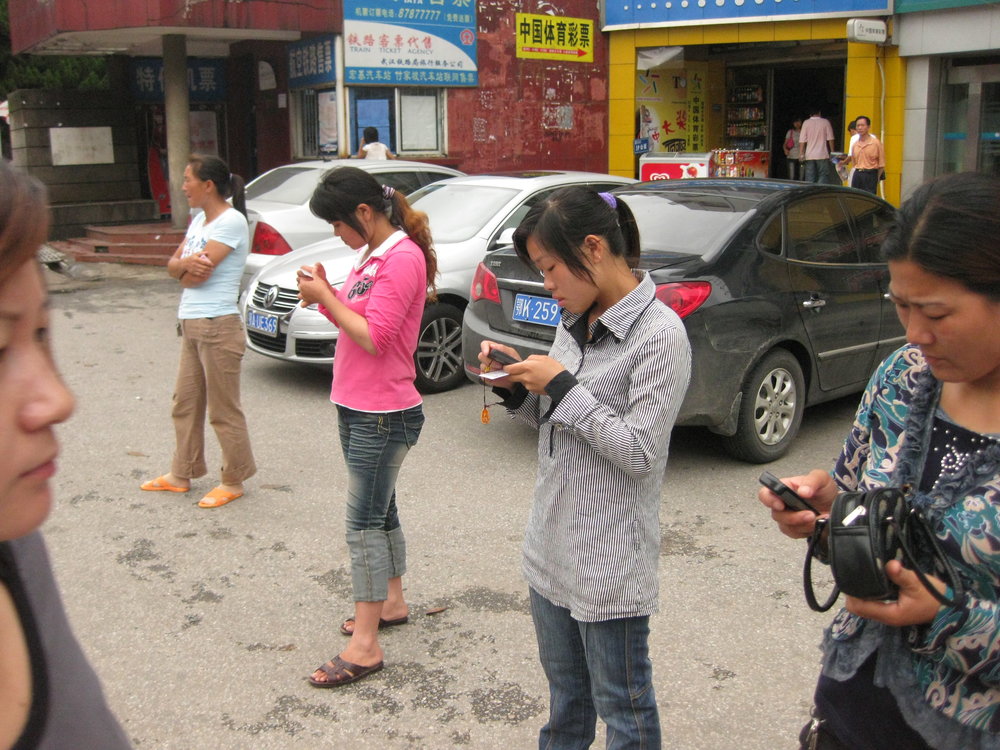Digital Urbanisms on the Margins: Chinese Migrants and Intensive Technology

In this project, Digital Urbanism Reshaping Social Connectivity: Intensive Technology in the Lives of Chinese Migrant Families and Youth, I analyze how newly urbanized Chinese migrant families and youth interact with urban digital architectures such as cellular to internet to manage social connections. I examine how ICTs change the way low-income migrant families and youth manage social connections in a rapidly urbanizing second-tier city in China, compelling them to negotiate the new convergences and divisions of physical and virtual life. This work is funded by the Fulbright program, PacRim foundation, and NSF.
Large-scale urban migration, the most massive shift of human population in history, is taking place in a new technoscape. In China, over 300 million migrants reside in cities; these communities represent some of the most marginalized and poorest groups that are now actively incorporating new communication tools into their lives. What do these coinciding cultural-technical processes mean for the people undergoing these shifts? Through deep ethnography of several rural-to-urban migrant social groups in a rapidly urbanizing city in central China I ask the following questions: what does living in the city with ubiquitous information communication technologies (ICTs) access do to a migrant’s sense of self and belonging? Does the digital realm reflect a new geography of equality and marginality? How does the mass affordability of ICTs transform the lives of non-elite users? What categories of ICT use emerge from the users’ experiences within this new cultural technoscape?
Based on my fieldwork in China over the past five years, I make the case that simply having access to or using digital communication technologies does not ultimately improve migrants’ opportunities materially or politically. However, migrants do use ICTs in a variety of ways across and within networks such as using ICTs to settle into the city, become urbanized, and have more options for managing connections with social ties. Furthermore, non-elite migrants across different groups reveal similar digital practices and meanings. Although these practices and meanings differ according to migrants’ technology backgrounds, stated hopes and dreams, expressed values/norms around privacy and sharing, and relationships to the built environment, these socio-technical processes reflect the emergence of important digital and physical social spaces that revolve around information access and new kinds of digitally mediated subjectivities.
I challenge existing conceptualizations of ICT use as a divide between “haves” and “have-nots” (or “have-lesses”) because these theories obscure the social relations to information by focusing on access to the tools, instead of information. Non-elite digital users have a definable, identifiable and observable set of socio-technical practices and they assign meaning to their practices in order to create coherence in a rapidly urbanizing context. Through this project, I make substantive theoretical and empirical contributions to reconsidering the significance of the "Digital Divide" paradigm in a society where communication policies enable universal access to popular ICT tools but do not necessarily guarantee free or unconstrained access to information with those tools. My analysis will also draw upon pervious fieldwork on the Chinese internet infrastructure with the Chinese Internet Network Information Center (CNNIC), as well as my fieldwork with migrants in Mexico.
I have chosen a 2nd tier Chinese city as my fieldsite because of several reasons. Not only is this a city undergoing an intensive phase of urbanization, with its massive migrant population and advanced digital networks, it is poised to become the next national industrial hub. Emerging regions like like the city I have chosen are known for being a more friendly and affordable place for migrant families because of its relaxed residency (hukou) policy. This is in contrast with larger cities such as Beijing and Shanghai that tend to have stricter enforcement of these same residency policies, which make it difficult for migrants to bring their child and spouse with them. As a migrant family-friendly city, we have an opportunity in Wuhan to learn about the specific set of social issues that migrant families encounter and the processes in which ICT are used to resolve or manage these issues.